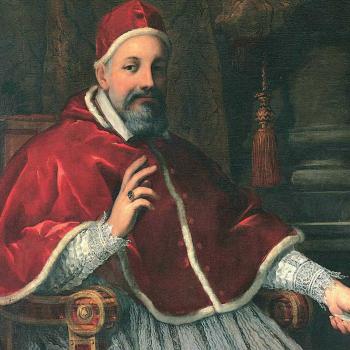I just got hold of Eamon Duffy’s latest book Saints, Sacrilege and Sedition: Religion and Conflict in the Tudor Reformations (Just published in Britain, and due out in the US in August). Duffy is a wonderful historian whose 1992 book The Stripping of the Altars: Traditional Religion in England, 1400-1580 was a staggering evocation of the religious life of Pre-Reformation England, and a grim account of how this was all swept away from the 1530s onwards. While generations of Protestants have believed that the Catholic Church in 1500 (say) was irredeemably corrupt and widely hated, Duffy shows its remarkable vigor and popularity. Instead of being a closed and arcane business for clergy alone, church life involved virtually every lay person, through a complex network of fraternities and devotional societies. Destroying that structure took a couple of generations, and a great deal of state-directed armed violence, mainly motivated by royal and aristocratic greed. After reading Duffy, you will never again accept without question the standard mythology of the Reformation – in Britain at least – as a spontaneous popular revolution. It was a vast act of political and cultural repression and plunder, inflicted by a cynical elite, which may or may not have accepted the new theologies. Duffy’s other recent work includes The Voices of Morebath: Reformation and Rebellion in an English Village.
When we think of the Reformation in terms of Luther and the church door, it’s salutary to think of some very different images that reflect how the revolution affected everyday people. Duffy reports one incident that occurred in 1549, when the up and coming landowner Walter Raleigh was riding through a Devonshire village (this was the father of the famous explorer). Seeing an old woman carrying her rosary beads, he ordered her to get rid of them immediately under threat of criminal penalty. The woman told her neighbors that “except she would leave her beads and give over holy bread and water the gentleman would burn them out of their houses and spoil them”. The enraged people rioted, almost lynching Raleigh, and order was restored only when the forces of the state “ruthlessly butchered” the villagers. Liberty of conscience is a wondrous thing.
Saints, Sacrilege and Sedition follows very much along these lines, stressing the cultural and spiritual losses associated with the Reformation. This latest contribution is nothing like as revolutionary as Duffy’s previous work, and it is really a collection of loosely connected essays, but nevertheless, it still makes for good reading. In a recent newspaper column, Duffy summarized his argument thus: “The destruction of the monasteries and most of the libraries, music and art of medieval England now looks what it always was – not a religious breakthrough, but a cultural calamity. The slaughtered Popish martyrs look less like an alien fifth column than the voices of a history England was not allowed to have.”
Obviously, for a modern-day Protestant this makes for uncomfortable reading, and a historian like Diarmaid MacCulloch presents a very different view of the depth and sincerity of Protestant activism in that era. But even so, it’s still hard to argue with Duffy’s core point that the Reformation was imposed from above on a population that mainly wanted nothing to do with it. One of his most striking themes is how successive generations of English historians have more or less accepted that argument, while stressing that the reforms were in the best interests of the ignorant people who had their old religious forms uprooted so savagely. Right up to the end of the sixteenth century, a Protestant minority ruled a country in which most people notionally conformed, but any sensible person knew that the slightest political change would bring them back overnight to the old ways. The defeat of the Spanish Armada in 1588 was a key turning point, and as a popular faith, Protestantism really took roots only from the 1590s onwards. Actually, that’s one thing that makes Shakespeare’s works so interesting historically, as he was living through that transition.
So it’s a familiar ethical (and spiritual) issue: how can a government justify forcing the vast majority of reluctant people to do things that it believes are in their best interests?












